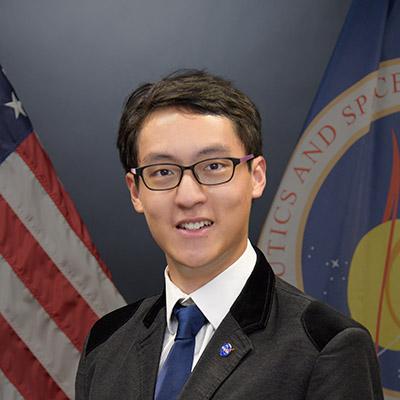This fall's aerospace engineering graduates have graduate school, teaching, working in industry, and traveling the world to look forward to after graduation.
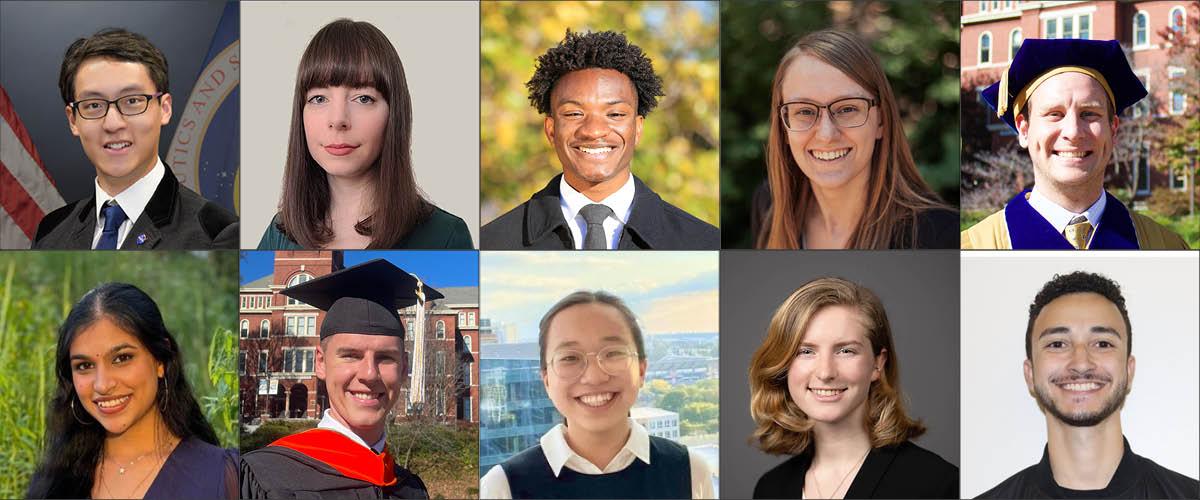
Kojo Bekoe-Sakyi
BSAE, 2023
What is your next adventure?
I want to have a creative career, so I’ve applied to the Georgia Tech School of Industrial Design. I want to pursue my master's in industrial design so I’ll have more flexibility to make things.
What about your next adventure are you most looking forward to?
I’m most excited about exploration. My mindset is to be open to anything. Also, just learning new skills and honing the ability to bring something from my head to physical existence will be really cool. I'm also looking forward to learning a lot more about manufacturing and what goes into making a lot of the things we use on a regular basis. I want to calculate and design theoretically and then create a real product.
Did you have any previous co-op, internship, or research experience in this area?
The summer of 2021 was my first internship through the Patti Grace Smith Fellowship. I worked at Airbus' US Space and Defense in Arlington, Virginia. It was during the pandemic, and things were mainly remote, but it was a really good experience, connecting what I did in the classroom to an actual problem and solving it. I used the first principles that I learned in class to come up with a completed project. I presented it to the company, saying here's something that I did to make your life easier, which was a really cool experience for me.
I also did an internship at Hermeus Corporation in Atlanta in the spring of 2022. I was on the structures team and worked on designing the wing leading edge for their hypersonic test bed vehicle. That was where I discovered that I really liked design and the design process because it was a lot of CAD, iteration, and explaining why things looked the way they looked. It also required having the first principles reasoning to support the aesthetics of the vehicle that they wanted to keep intact as much as they could. It was a really good challenge for me, but it also made me realize how much I actually like balancing engineering with how things look. That's when I started my minor in industrial design after that internship.
In fall of 2022, I conducted research with the Air Force Propulsion Outreach Program through the Aerospace Systems Design Laboratory (ASDL). It was another two-semester design process of modifying a small gas turbine engine, and we were making modifications to it to not only increase the thrust-to-weight ratio but also to generate a certain amount of electrical power for two minutes. It taught me a lot about teamwork. It also showed me how easy it is to mess things up and how to learn from mistakes and failures. I learned some big lessons from that research project, and it also reinforced my decision to follow my path toward the design route.
How did your educational experience at Georgia Tech help you to achieve your goals?
Georgia Tech boosted my confidence in my ability to learn. Every internship and project that I was on outside of Georgia Tech, there was a huge learning curve, and every time I thought, I don't know if I can do this, but then the Georgia Tech in me would kick into gear. I would learn what I needed to know to move forward. My Georgia Tech experience really helped me not to count myself out or sell myself short, but have the confidence to at least try and yeah, see where it goes. My experience at Georgia Tech really taught me how to learn and how to learn fast.
What advice would you give to an underclassman who would like to follow the same path?
Engineering is very much a team sport, and a lot of the problems that we will solve once we leave will be with a team of other people. Be a good teammate. If you're not the smartest person in the room, be the kindest person in the room. Kindness opens a lot of doors that you don't think would be available to you. People are more willing to help you handle what they're giving you because of how you treat them. Being genuinely kind to people is one way that will always set you up for success and will never come back void. Even before being a great engineer, make sure you're a great person and that can look a lot of different ways.
(text and background only visible when logged in)
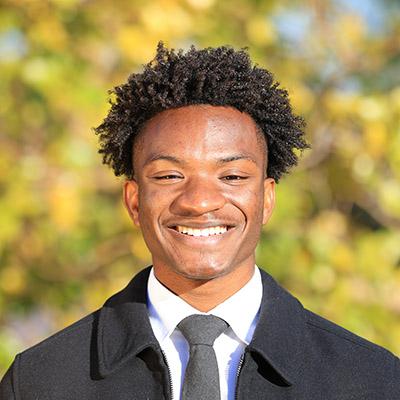
Rob Clark
Ph.D. AE, 2023
What’s your next adventure?
I’ll be working full-time with General Electric (GE) Aerospace and starting a part-time lecturer position with the AE School here at Georgia Tech.
What are you most looking forward to?
I’m most looking forward to getting to teach in the classroom and being with students to help them on their learning adventure. Seeing that light bulb moment is one of the most rewarding things you can do, so I’m extremely excited to stay here at Georgia Tech teaching.
I’m also looking forward to returning to full-time work at GE Aerospace. I previously interned with GE when I was pursuing my undergraduate degree at Purdue, and in 2015 I began work there full-time. I left GE back in 2019 temporarily because I wanted to pursue my Ph.D. before I got too deep into my career. I love my career at GE working on exciting new propulsion technologies and designing aircraft engines, so being able to split my time between teaching and working in industry and doing two things I love is a great opportunity for me.
Did you have any previous co-op, internship, or research experience in this area?
My first internship was with Lockheed Martin in 2012 as a summer intern working on technology mapping between Lockheed and Sandia National Lab. I later interned with GE Aviation in 2014 as a mechanical engineering intern, working on testing nacelle anti-ice valves for the LEAP engine program. After that internship, I had the opportunity to work at GE Aviation full-time as part of the Edison Engineering Development Program (EEDP). I worked at GE full-time for four years while also getting a master’s degree at Ohio State through the EEDP program.
In terms of research, I didn’t have a lot of aerospace engineering research background before coming to Georgia Tech. At Ohio State I researched deposition in the hot section of aircraft engines, but that was only for a year. Most of my technical experience was from my internships and working in industry at GE before coming back to grad school full-time.
How did your educational experience at GT-AE help you achieve your goal?
I wanted to get my Ph.D. because I want to be able to teach, so I tried to get into every kind of teaching opportunity possible. I first started in the Tech to Teach Program here at Georgia Tech, which prepares graduate students and postdocs for college teaching positions. During my time here in aerospace engineering at Georgia Tech, I also found that the AE professors were really helpful at getting me additional exposure in the classroom.
Dr. Jechiel Jagoda let me come in and teach some of his undergraduate thermodynamics classes and Dr. Jimmy Tai also let me come in and guest lecture a few times in his graduate propulsion system design class. I was also lucky enough to serve as the instructor of record for COE 2001: Statics and AE 3531: Controls, which were both very rewarding teaching experiences. The classes I taught reinforced my desire to teach in aerospace engineering, and the coursework I took here at GT-AE helped improve my overall fundamental aircraft and engine design knowledge for my career at GE.
What advice would you give to an underclassman who would like to follow the same path?
Get to know your professors. Whether you want to go into teaching or go into industry (or both, like I did), get to know your professors because they are an invaluable resource. Even if you don’t need help with a problem, go to office hours so that your professor knows who you are in a class of 50 or 100 students. It’s hard for professors to get to know everyone, so try to build that personal connection because 1) you’re going to learn the material more if you are engaged 2) if you need a letter of recommendation, they will be able to pull specific examples and have a personal connection with you.
Don’t be afraid to try and fail at different experiences. I’ll be honest, none of my internships were areas that I ultimately saw myself working in from a technical enjoyment perspective. However, the process of interning and getting experience was just as valuable as finding an internship in an area that I loved. It’s a great way to narrow down what you’d like to do later on in your career and as a student you shouldn’t be afraid or upset if you find out that a certain internship is not what you want to do. No matter what, it will help you shape your future. It’s better to find out that it’s not a match in a three-month internship than in a full-time position.
(text and background only visible when logged in)
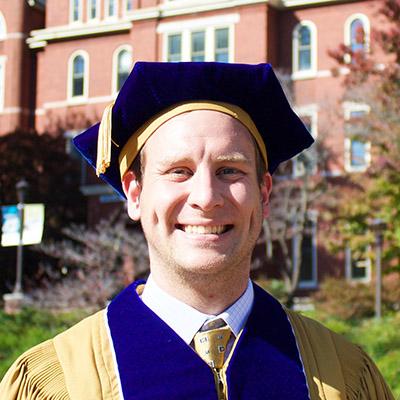
Eliezer Zavala Gonzalez
BSAE, 2023
What is your next adventure?
I'll be coming back to complete my master's in aerospace and will be joining the Aerospace Systems Design Lab (ASDL). I'll be doing a systems design optimization concentration as a graduate research assistant with Professor Dimitri Mavris.
What about your next adventure are you most looking forward to?
Getting a master's is not something that you do because you have to; it’s something that you want to do. I'm really looking forward to taking classes that align with my interests, but also perhaps employing a shift in perspective on education itself. For many people my age, all we've done is school to this point. So, I want to change my perspective since I will be working as a graduate research assistant. I'm looking forward to making that paradigm shift from student to student and employee.
Did you have any previous co-op, internship, or research experience in this area?
I had an internship at Boeing this past summer and was on the flight deck crew operations team. It was mostly a systems engineering position where you have a bird's eye view of everything that goes on in the flight deck. The flight deck is everything that's in front of the door that the pilots go into, everything in front of the pilots. I really enjoyed that, rather than pinpointing one specific ability or a scale on aerodynamics or propulsion or anything else. I really like the idea of having more of a broad perspective of everything and being a master of all. So, I believe that this systems engineering master’s degree will really help me hone in on that scale of understanding of the product throughout its entire cycle from concept all the way to even recycling at the end.
After my first year, I interned at Northrop Grumman as a manufacturing engineering intern. It exposed me to all of the different manufacturing processes.
I also completed three semesters of research. Two of them were focused on hypersonic vehicles which was a lot of fun. One of them was at Georgia Tech Lorraine, which focused on indoor air quality and carbon dioxide estimation. It was a very good opportunity to pursue given that I was studying abroad, and it was also counted for credit for my BS/MS degree.
How did your educational experience at Georgia Tech help you to achieve your goals?
Having the freedom to explore the different avenues of interest really helped me hone in on exactly what I wanted to do. It is a great thing about Georgia Tech. Very early on, the introductory courses show you a very good snippet or teaser of what an aerospace degree encompasses. For example, in AE 1601, you get a good overview of aerospace engineering with spacecraft and aircraft and engineering models. It's those same concepts that you then really delve into in the next couple of courses. And because of that, you understand what you want to pursue.
What advice would you give to an underclassman who would like to follow the same path?
Don't be afraid of change, but adapt to your needs and interests. Don’t just stick to the status quo. Don't compare yourself to others. For example, if a lot of people are taking a set of classes in a certain order don't be afraid to change it up because you want to take a specific class with another professor, or because you have other interests in mind, whether it be study abroad, having more time for extracurriculars or for any other reason, don't be afraid to venture out. Just follow your gut and forge your own path because once you do that, you will really achieve your fullest potential by finding exactly what you want to do.
(text and background only visible when logged in)
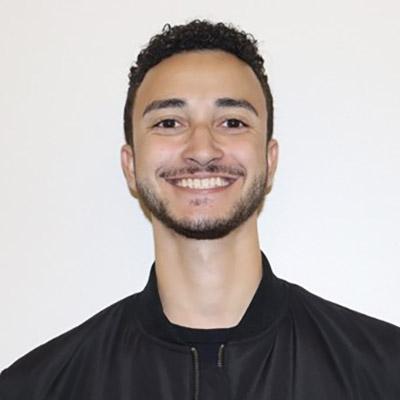
Alexandra Hickey
PhDAE, 2023
What’s your next adventure?
I started my next adventure a little early, but I recently moved to Hampton, Virigina to start working at NASA Langley Research Center in the Computational Aerosciences Branch.
What are you most looking forward to?
I’m most excited about working with Fund3D. It’s a computational fluid dynamics (CFD) code that I have worked with before, but the opportunity for me to grow and learn from the experts who developed the program is really exciting. I’m also excited to do a lot of fundamental science as well as continue to grow as a researcher. I’m super excited for what’s to come.
Did you have any previous co-op, internship, or research experience in this area?
During my undergraduate degree in Mechanical Engineering, I worked in a couple of different labs at the University of Colorado at Boulder, where I participated in cutting-edge technology demonstrations for small satellites. Then, while I was completing my master’s degree in mechanical engineering at CU Boulder, I got the opportunity to conduct research during an internship at Los Alamos National Laboratory (LANL), where I worked on space systems related to treaty verification for space nuclear detonation detection. I enjoyed all of my research experiences but wanted to explore other aspects of space systems and development, so when I was looking for Ph.D. programs, I looked for programs with lots of different types of opportunities.
How did your educational experience at GT-AE help you achieve your goal?
I started as a doctoral student in the Aerospace Systems Design Lab (ASDL), working in the defense and space division, and in my first year I participated in a variety of projects, including one related to space debris removal. The program is designed in such a way that I was able to work on a lot of projects and I eventually found myself working in CFD, which has a lot of applications related to entry, decent, and landing vehicles. I found it to be a lot of fun. The program helped me find what I love to do because of the amount of opportunity to try new things and the flexibility to pursue areas that you really enjoy
What advice would you give to an underclassman who would like to follow the same path?
Be willing to try everything because you never know what you’re going to like. As an undergraduate student, I volunteered my time to research at a few labs in my undergraduate institution ,and eventually, it turned into a paid opportunity. That experience, in combination with my experiences at LANL eventually led me to pursue my Ph.D. I also volunteered my time here at GT and taught GT 1000 for three semesters. I wanted to experience what it was like teaching in a university setting and Georgia Tech has so many opportunities to get involved and try new things. I’m very introverted, so I didn’t know if I would really enjoy teaching because I don’t like public speaking. But I found out that I enjoyed it so much that I taught it for three semesters and would teach again if I could.
(text and background only visible when logged in)
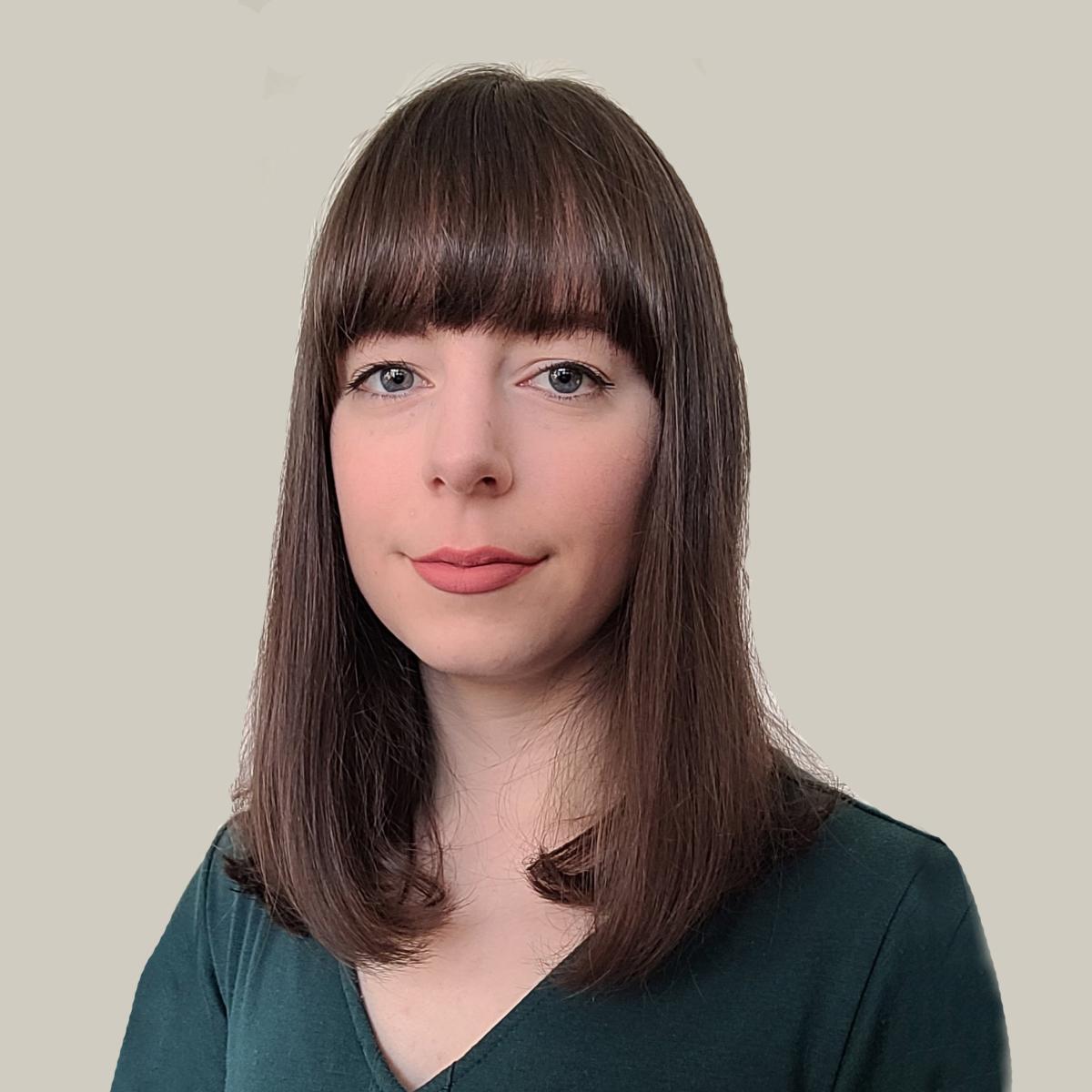
Grace Krahn
MSAE, 2023
What is your next adventure?
Starting in February, I plan on traveling through Europe and backpacking from Norway to Italy. I’ll fly into London, then make my way to Norway and then work my way south to Rome, Italy by train. I studied abroad at the Georgia Tech Europe campus in the spring of 2020, so my semester was cut short by COVID and I didn’t get the full semester-long experience.
What about your next adventure are you most looking forward to?
I’m really looking forward to exploring places I’ve never been and getting back some of that lost time. I plan on spending one to two months abroad, so I won’t have to rush from place to place. I’m excited to visit art galleries and museums, discover new cultures, and see the Northern Lights while I’m in Norway. I’m also looking forward to starting an exciting career in the commercial space industry when I get back from my travels.
Did you have any previous co-op, internship, or research experience in this area?
I completed the BS/MS Program, so I’ve been at Georgia Tech for almost six years and had a lot of different internship and research opportunities. I worked for one semester at the CAMM Lab Special Purpose Vehicles VIP learning controls under Prof. Mark Costello. I spent a semester conducting research with Prof. Tim Lieuwen at the Ben T. Zinn Combustion Lab, which then led me to the Space Systems Design Lab where I worked with Prof. Glenn Lightsey over the last year of my undergrad on Lunar Flashlight mission operations. I wanted to work more closely with flight hardware and spacecraft in Dr. Lightsey’s lab, so I started my master’s education in Fall of 2022 as a graduate research assistant on the VISORS mission.
VISORS (Virtual Super-Resolution Optics Using Reconfigurable Swarms) is a multi-university CubeSat that is comprised of two separate 6U CubeSats that precisely maneuver relative to each other in space to form one distributed telescope. Its goal is to take detailed images of the solar corona by having one satellite act as the telescope optics while the other holds the camera at a 40-meter focal length, which is extremely close by space terms!
We’re currently in assembly, integration, and testing (AIT) process for the mission. As the VISORS systems engineering lead, it has been both a great adventure and very challenging to navigate such a complex project that involves so many other universities and institutions.
I did four internships while a student at Tech, with the first two being at Lockheed Martin Skunkworks. The first internship was working in the systems integration laboratory and the second internship was in conceptual design for aircraft, which was really exciting. It was basically like AE Senior Design, but in industry, so I really enjoyed that job and working on the very early stages of design. I then interned at Blue Canyon Technologies as a systems engineer intern working on VISORS – the same mission I would later that year devote my research time to in graduate school. Finally, my internship last summer was at Sierra Space in their Advanced Development Programs department, working on the concept development of spacecraft.
How did your educational experience at Georgia Tech help you to achieve your goals?
Tech really gave me the tools to be able to tackle problems. I’m a systems engineer at heart, so through the training and courses I’ve taken, I now always look through things from an overall perspective first and that’s been a really helpful approach when solving problems. My time at Tech hasn’t been easy and through the coursework and projects I feel like, if I can do this, I can do anything.
What advice would you give to an underclassman who would like to follow the same path?
First, I would say, apply to the Matthew Isakowitz Fellowship Program (or programs like it), especially if you want a career in space. Being a MIFP Fellow cemented my goal of wanting to work in commercial space and it allowed me to meet so many inspiring people. Also,
If you really want to explore different parts of the industry, now is the time to do it. I had a situation after my second internship with Lockheed Martin where they gave me a return offer and I had to make a choice. On one hand, I really liked the job, but on the other I wanted to try exploring the space industry after only experiencing the aeronautics side. I wanted to learn more about working on space projects, so I decided to take a risk and decline the offer. What later came from that a few months later was another internship with a commercial space company – Blue Canyon Technologies. I found that through and through, I’m an aerospace girl, so it didn’t matter if I was pursuing space or airplanes; I love all aspects of it and was open to different positions. However, that specific internship with Blue Canyon Technologies really helped me get my foot in the door and I was able to get funding for graduate school and funding for the VISORS project that I’m working on now. I’m really happy that I took the risk because right now was the time to do it, so be bold.
(text and background only visible when logged in)
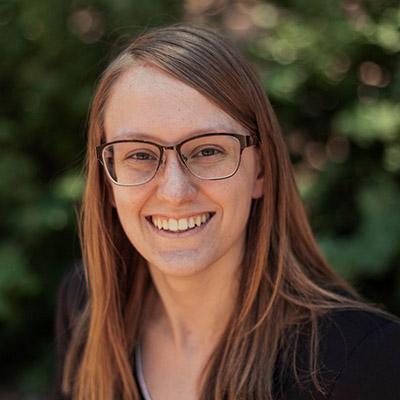
Snigdha Nellutla
BSAE, 2023
What is your next adventure?
I’m in the BS/MS Program so I will continue on to my master's in aerospace at Georgia Tech. I will be working in Professor Carr’s Planetary Exploration Laboratory (PXL) where I will continue my research on the Venus atmospheric return mission. After I earn my master's degree, I'll take some sort of gap semester. Then in 2025, I will start to look into PhD programs in either atmospheric or planetary science.
What about your next adventure are you most looking forward to?
I'm really looking forward to delving deeper into the research I've been working on with Professor Carr, in the Planetary Exploration Lab (PXL) for about a year now. I think it's really what taught me the most about what I want to do in the future. It’s a real-life mission that's being planned sometime within the next 10 or 20 years. It’s really cool to see that my work can make an impact somewhere.
It’s also great that I'm able to contribute to something that will further advance our knowledge of outer space and planetary science. The mission itself is planning to launch sometime in the early 2040s and it's a sample return mission from Venus. There's going to be a balloon that floats through the atmosphere and collects solid liquid and gas samples, and the goal is to be able to learn about traces of biosignatures as well as the mysterious UV absorber that's present in the Venus atmosphere.
Did you have any previous co-op, internship, or research experience in this area?
I had two internships during high school, but as far as the work that I'm more interested in has been primarily through PXL, and before that I was in a class called, Mars Vertically Integrated Project Program (VIP). I was in it for three semesters from my sophomore year to my junior year, and I did a lot of work on life support systems for Martian missions that will be planned way in the future.
How did your educational experience at Georgia Tech help you to achieve your goals?
At Georgia Tech, the possibilities truly are endless. No matter what you're interested in, I feel like there are so many things that are offered, and it is easy to find. When I first started at Georgia Tech, I knew that I was interested in outer space. It's something that I've dreamed about since I was in second grade. And obviously, Georgia Tech is the best place in Georgia for aerospace.
But, once I got here, after taking some classes, my focus was geared more towards the science side of space. Due to the classes that I took, there was a special topics class that I took called Space Instrumentation for Life Detection. It was what changed my entire perspective and shifted me over to focusing on Earth and atmospheric and planetary sciences. So, no matter how long it takes, no matter how many things you must try, you can always find something for you. There's something for everyone out there.
What advice would you give to an underclassman who would like to follow the same path?
Pace yourself. My freshman year was during Covid, so I lived at home. Once I finally got to campus as a sophomore, I lacked a sense of community because I pretty much lost an entire year of my college experience. I tried to go out there and do everything that I could. I took 17 credit hours that semester. I was on the dance team. I was on the executive board of two other organizations. I really tackled everything at once because I thought that I had to catch up. It’s okay not to be perfect, and it's okay to take time to learn and grow, especially to learn more about yourself. What I thought I would be doing at this point in life is very different from what I thought a couple of years ago and for the better, for sure. Try new things and take risks.
I'm really glad that things ended up the way that they did, but for an undergraduate who wants to follow the same path, or even if not just in general, it's important to understand that it's okay to deviate from the plan that you created.
From high school, I was always under the impression that you should know exactly what you're doing, and always have a plan for everything. And that's how I was through my years of schooling. But after I got to Georgia Tech specifically sophomore year onwards, I quickly learned that that's not the case and it's okay to not always follow your plan because there are always new adventures and new opportunities that come up along the way.
(text and background only visible when logged in)
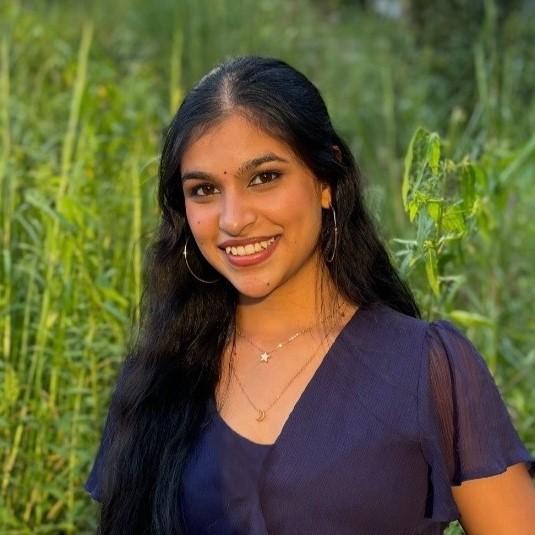
Grant Schlichting
MSAE, 2023
What is your next adventure?
After graduating from Tech with my master’s, I’ll be heading to Wichita Falls, Texas to begin my pilot training for the U.S. Air Force at Sheppard Air Force Base. I’m an active-duty Air Force Second Lieutenant whose first assignment was grad school and now I’ll go fly.
What about your next adventure are you most looking forward to?
The biggest thing I’m excited about is fulfilling somewhat of a childhood dream. I always liked planes, but it wasn’t until I was a sophomore in high school that I really realized I wanted to fly. So, it’s been a nearly 10 year journey to get to where I’m going to be and get to start flying. It’s cool to see the diligent hard work, keeping your nose down to the grindstone year after year to finally lead to a large reward.
Also, it’s exciting to now start following in the steps of my mom. She was in the Air Force and went to pilot training in Columbus, Mississippi where she flew T-38, which is going to be the plane that I’m going to get to fly too.
Did you have any previous co-op, internship, or research experience in this area?
As a Georgia Tech student in the Aerospace Systems Design Lab, I worked on a few different projects, one on digital engineering to create digital libraries for aerospace engineering firms to allow them to run more efficiently and improve information sharing amongst their units. I’m fortunate that I got to work on projects related to my Air Force work with logistics and assets.
By being able to study this in an academic setting, I feel a bit more prepared for when I get into an operational squadron and need to implement efficient leadership decisions.
I worked on another project under the Office of Naval Research on superconducting technologies for shipboard applications, so completely out of my wheelhouse, but that’s what’s cool about the opportunity at Tech, it preps you to be an engineer.
How did your educational experience at Georgia Tech help you to achieve your goals?
Georgia Tech is such a huge name and it gets you a lot of exposure to networking opportunities with influential and prominent people in the industry. I got to meet executives from Northrop Grumman, Raytheon, and Boeing that were visiting the Aerospace Systems Design Lab where I conduct research.
Even more than the name itself, Georgia Tech really opened my mind and provided a paradigm shift in how I look at design in that transition from undergraduate student to a graduate student conducting research. I was able to get an in-depth understanding of the motivation to various decision-making methods keeping aerospace principles in mind. The skills and tools I’ve learned at Georgia Tech, I can use in my squadron to make the lives better for the people around me and be a strong leader.
What advice would you give to an underclassman who would like to follow the same path?
Research, research, research. As an undergrad, get into research, whether it be experimental, computational, or analytics. It provides you a great opportunity for you to then apply for graduate school.
Learn coding skills. It’s a valuable skill that you’ll need to know as an engineer.
Learn how to communicate well. Work on how to present technical information to engineers and non-engineers. Doing this well will make you a huge asset. Present every opportunity you get, from conferences to in front of class. There’s a lot of value in learning how to communicate well, and it is a skill that will stand the test of time.
(text and background only visible when logged in)
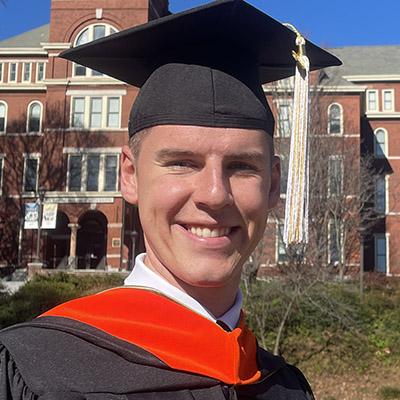
Eleanor Smith
BSAE, 2023
What is your next adventure?
I’m starting a company and taking a gap semester to volunteer in Southeast Asia. When I return in May, I’ll work for Lockheed Martin as a business development analyst in their commercial civil space sector in Denver, Colorado.
Specifically, I will go to Vietnam, Nepal, and Thailand. I'll go to various locations to volunteer and help the community. I grew up in China, but haven’t returned to Asia since I was a kid. One of my teammates from a past competition, Aaron Hammond, will do a similar trip for a year. We talked about it, and my boyfriend, who was on the same team, was also interested. We realized there would never be a better time to disappear for three months than now. I even asked my manager at Lockheed Martin and he agreed this was the time.
As for my company, I’ve designed equipment to hold the cochlear implant charger and the actual implant itself. It is in the shape of a bear to appeal to children. They can put the bear on their bedside table and hold all their accessories there. We're going to be selling directly to doctors offices, and it's specifically designed for children who are born deaf or just people who are deaf that then need cochlear implants. Cochlear implants are devices that basically give deaf people the ability to hear. It's incredible technology. I was inspired to build this for my boyfriend, Trey Farmer, because he’s deaf and has cochlear implants.
What about your next adventure are you most looking forward to?
My new position at Lockheed Martin. I think business has just been such a significant pivot for me. There's still so much to learn. It's kind of an exciting mix of things because this sector of business within the space industry requires having a technical foundation. It's neat how I still use my technical side but then apply it to business. I get to use my creative thinking a lot more, especially empathizing with people, and I also get to do a little bit of the design process.
Did you have any previous co-op, internship, or research experience in this area?
I worked with Gulfstream for two co-op rotations. I specifically asked to be on the operations side of the production of airplanes. I wanted to get my hands dirty and see the mechanics of everything, how it worked, and how it worked with people and on the floor, as in the workshop floor and the mechanic floor. I wanted to work with mechanics directly, so I asked for that position partially because I saw the Innovation Engineering and Flight division.
How did your educational experience at Georgia Tech help you to achieve your goals?
Georgia Tech also gave me a better understanding of engineering and what engineers do. It helped me to know what I truly wanted to pursue. When I went into aerospace engineering, my engineering knowledge was that engineers build things, which, to my mind, was that they designed things. I found that engineers design how to build the things that other people have already created. Engineers rarely get to do actual design work at the forefront, except in very particular positions, and then aerospace engineering, in particular takes you way further down from building. You are the expert of this specific thing on a unique track.
Honestly, the rigorous coursework put me where I was pushed too far. But that was so good for me because Georgia Tech has the Center for Mental Health Care and Resources (CARE) that I contacted for help. They connected me with both CARE and other resources that I needed. Eventually, I learned that I have ADHD. I figured out a few other things and how to approach how I do my work differently. It was a game-changer for me.
The cochlear implant was actually designed as a part of my industrial design minor. Industrial design has a Launchpad Expo where all the industrial design students show their work. There's a particular marketplace set aside for this class, and the whole point is you have to come up with a product, build 10 of them, and have them ready so that you can sell them to people at the Expo. It's a great concept and helps you think like an entrepreneur.
What advice would you give to an underclassman who would like to follow the same path?
Enter competitions. They give you exposure and experience that you will not get in any course except maybe the space system design, but that's so late in the coursework. And in comparison, if you enter competitions, you could be working on the cool stuff all year, four years, or five years. Competitions give you such a good foundation and understanding of missions and vehicles. And it's also a great way to test if something interests you. I could do competitions for the rest of my life. You also get as close as you can in this major to building a thing and seeing it run, and that's huge. It's awesome, and it feels great.
Secondly, get help when you need it. Use CARE services because they are wonderful.
(text and background only visible when logged in)
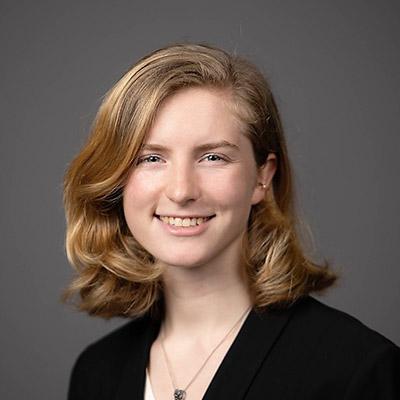
Audrey Waliliong
BSAE, 2023
What is your next adventure?
I will take a break next semester and will begin my master’s program in the fall, but will take this summer to spend time family. I plan on looking for an internship doing vertical lift or robotics for the summer.
What about your next adventure are you most looking forward to?
I'm looking forward to going back to see my family in Indonesia.
Did you have any previous co-op, internship, or research experience in this area?
I did an internship at Warner, an automotive company, last summer where I did controls engineering, but I worked mostly with software. I entered the data for software testing.
This past semester, I was working with and I'm still working with Professor Marilyn Smith in the Nonlinear Computational Aeroelasticity Laboratory (NCAEL). We're doing some battery testing which is one of the most fulfilling lab experiences I've had because I got to do things hands-on.
I also get to work with a lot of great people including Lee Witcher. In the spring, I also worked with Professor Kelly Griendling in preparation for the summer STEP Program. We worked on a robotics project for the program in Albany that she was hosting. I designed a small helicopter kit or quadcopter kit for the high school students to build in the summer with two other AE students.
How did your educational experience at Georgia Tech help you to achieve your goals?
I now understand how planes fly. That was my main goal. There are also a lot of opportunities to try different things. I got to try more of the simulation side towards the beginning of my undergraduate education and then now I get to do more lab testing. It's given me opportunities and real experience in different areas of aerospace. With my skills, I’m open to any new experiences.
What advice would you give to an underclassman who would like to follow the same path?
Be interested in everything because it makes it easier sometimes. Also, community is important. Make friends because you will help each other out. Usually, people who are proactive band together and then you get a lot of help from them, like in school, but also when looking for work and stuff like that.
Get involved. I am in the GT Lifting Club. I compete for their powerlifting team, and it’s a community of people who often go to the Campus Recreation Center (CRC) and lift heavy weights. I have formed friendships through that community.
(text and background only visible when logged in)
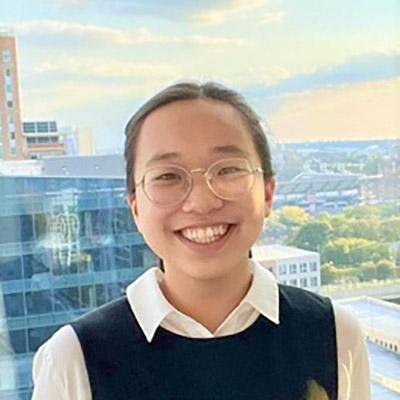
Alan Yeung,
BSAE, 2023
What is your next adventure?
I'm currently applying to a couple of Ph.D. programs. My research will focus on spaceflight operations specifically in orbital megastructures and how to construct them. I’m accepted into the BS/MS program here at Georgia Tech as well. I will be interning at JPL this upcoming spring. Currently, I'm on the Lunar Flashlight team as a flight director and also a mission operation engineer on the VISORS team. I definitely want to continue my work in those areas. Ultimately, I plan to go into industry.
What about your next adventure are you most looking forward to?
I’m looking forward to researching, learning, and understanding flight operations and human factors in spaceflight. I want to know what flight controllers need to be aware of and how they react to anomalies. It will be very useful in my research because I want to research the space operations field but in the context of building large-scale structures or megastructures in space that involve human habitation. This involves proximity operations of perhaps hundreds of spacecraft in tandem to build these orbital structures. There are so many questions to be answered like: How do we deal with that? How do we create fault response structures? How do we have enough operators and valid human-computer interaction systems to safely? How do you operate in that environment? So, I'm excited to kind of delve into that realm and continue down that kind of research path.
Did you have any previous co-op, internship, or research experience in this area?
I started at the Georgia Tech Space Systems Design Lab in August of 2022, working as a mission operation engineer and a flight controller for Lunar Flashlight, which actually launched on December 11, 2023. We are still operating that spacecraft today. It is a 6U CubeSat originally intended to search for water ice on the Moon. After NASA JPL ended their portion of the mission, we continued to operate the spacecraft as a doorway to validate the technology onboard. We currently fully own it, and it is fully run by an undergraduate team where I worked. As the flight director for that project, I am responsible for, and working in coordination with, the flight controller teams to operate and command it.
My research directly led to me getting my internship at NASA Johnson Space Center, working on human spaceflight operations with the United States Visiting Vehicles Group for the International Space Station (ISS). I worked with every US vehicle that interacts with ISS in proximity operations, such as Dragon and Cygnus. It was an amazing experience, and it built upon my flight operations interests.
I also worked on Sierra Space’s Dream Chaser vehicle this past summer as an intern. That was a great experience, getting into the human space flight field.
How did your educational experience at Georgia Tech help you to achieve your goals?
Georgia Tech has special opportunities that you won’t find elsewhere, like the Lunar Flashlight mission. We are the first undergraduate student university team to be allowed to operate a NASA spacecraft as the primary operator. So, it's a unique relationship that we have that you won't get elsewhere. The primary mission objective was to do a technology demonstration of our laser payload and our propellant. We wanted to demonstrate that we could use the ASCENT Propellant, which is a far less toxic fuel compared to hydrazine.
We also wanted to prove that we could utilize our four-laser reflectometer. When we couldn’t reach the Moon, we sought to test this instrument by seeing if it would be possible for us to fire these lasers in space and whether we could see them at observatories on Earth, which we did.
Overall, those are successes for the technology demonstration mission. We knew that we could fire the lasers and we knew we knew this propellant worked. We’ve escaped Earth’s orbit, and we’re currently in solar orbit. We are using our star tracker as a kind of image taker for an image campaign for Professor John Christian’s Optical Navigation group.
Also, Georgia Tech was instrumental in building out the fundamentals and allowing me to get involved with the areas that I’m interested in. I realized very early on that I wanted to go into that system, engineering space, and the flight operations realm. What's really great is that you can just email a professor to ask for an opportunity. I emailed Professor Glenn Lightsey a couple of times and after a couple responses he said, "Yeah, I have this great project for you".
What advice would you give to an underclassman who would like to follow the same path?
Seek out the upperclassmen early because they will have the experience to give you input and guidance.
Be persistent. Asking doesn't hurt. So, if you keep asking, someone's going to end up saying yes. Cold emails are super important, something I learned later in the game, but cold emailing people actually works. If you want to be part of a lab, email the professor and continue emailing them, if they don’t respond right away. Say, hey, I'm still interested in this position. I’d love to have a conversation with you about it, even if you don't have an opportunity right now. It's the best advice I can give.
(text and background only visible when logged in)
